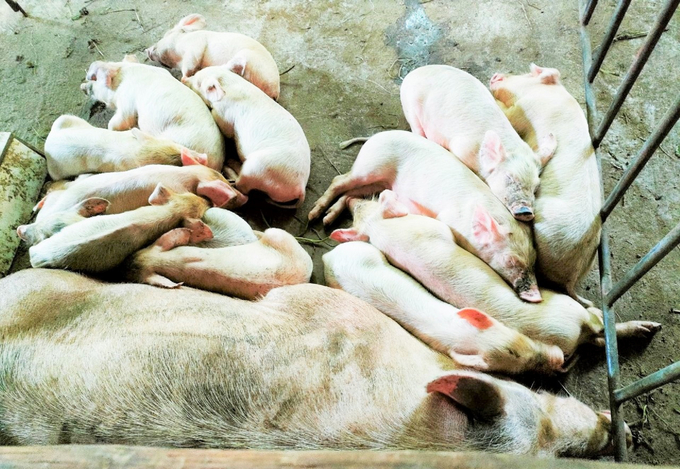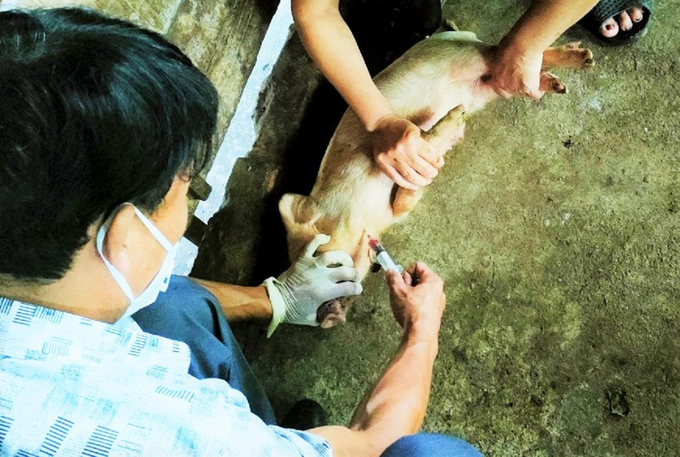May 25, 2025 | 17:19 GMT +7
May 25, 2025 | 17:19 GMT +7
Hotline: 0913.378.918
May 25, 2025 | 17:19 GMT +7
Hotline: 0913.378.918

African swine fever is currently threatening the area with the highest proportion of large-scale household pig farming in Ha Tinh province. Photo: TN.
On August 6th, Mrs. Tran Thi Binh from Na Trung hamlet, Cam Thach commune, Cam Xuyen district, discovered that 19 out of 38 pigs showed signs of not eating and subsequently died.
Immediately after, she reported to the local authorities and specialized agencies, who collected samples for testing and confirmed that the animals were affected by African swine fever (ASF). By August 15th, the disease had spread to 6 households and 4 hamlets, including Xuan Lau, Na Trung, My Thanh, and Cam Dong, affecting a total of 44 pigs.
According to Mr. Tran Van Son, Vice Chairman of the People's Committee of Cam Thach commune, following the appearance of ASF, the commune used 1 ton of lime powder and 60 liters of detoxification chemicals for disinfection in the affected households. Control measures for buying, selling, and transporting pigs within the affected area were also intensified.
"Based on our survey, households that were affected earlier had people buying and selling piglets with inquiries and negotiations. This could be a cause of the disease's spread, transmitting the pathogen from sick to healthy pigs. Additionally, the transition from prolonged hot weather to sudden autumn rains weakened the animals' immune system, making them more susceptible to disease transmission," Mr. Son remarked about the outbreak's likely causes.
Following the outbreak in Cam Thach commune, ASF also appeared in the household of Mrs. Nguyen Thi Lan in Trung Dong hamlet, Cam Duong commune, with one infected sow. All affected pigs were promptly culled in cooperation with livestock owners, and urgent measures were taken to contain and control the outbreak.
Mr. Le Ngoc Ha, Vice Chairman of the People's Committee of Cam Xuyen district, stated that due to the unique situation of having the largest population of pigs in household farming in the entire province, the prevention and control efforts faced numerous challenges in the face of this highly contagious disease.

Image of the pig herd affected by ASF from Mrs. Tran Thi Binh in Cẩm Thạch commune, Cam Xuyen district, before being taken for disposal. Photo: TN.
"We have issued documents regarding the concentrated implementation of measures to prevent and control ASF in the area. At this time, pork prices in the market are starting to rise, and people may sell sick pigs, leading to the risk of disease spread and loss of food safety if not tightly controlled. On the other hand, people are replenishing their herds, potentially bringing disease from elsewhere into the area. Therefore, disease prevention and control efforts must be concentrated and resolute. The district is intensifying inspections of transportation, slaughter, and trading activities to handle violations strictly," Mr. Ha stated.
Warning about the future development of ASF, Mr. Nguyen Hoai Nam, Deputy Head of the Division in Charge of Veterinary Management (Department of Livestock and Veterinary in Ha Tinh), emphasized that the total pig population in Ha Tinh is currently quite large (around 400,000 pigs) with a dense farming density. Hence, the risk of disease outbreaks on a household scale is very high due to people not following biosafety measures in livestock farming.
Furthermore, from the beginning of the year until now, the province has not experienced a significant ASF outbreak, leading to people having a complacent attitude. Some localities have not emphasized livestock farming and veterinary work, lacking skilled personnel. Thus, planning suitable prevention and control measures in the event of an outbreak becomes challenging.
To prevent the widespread spread of the disease, the Department of Livestock and Veterinary in Ha Tinh recommends that district and commune-level authorities enhance information dissemination and communication about the situation and development of the disease. This includes raising awareness and responsibilities among each household, livestock establishments, individuals engaged in trading and slaughter, in order to proactively implement disease prevention and control measures.

The relevant authorities organizing vaccination campaigns to enhance immunity for livestock. Photo: TN.
Guidelines for livestock farmers include implementing biosafety measures, refraining from expanding or replenishing herds without ensuring safety conditions, promptly reporting when sick or unexplained deaths of pigs occur, refraining from self-treatment and selling diseased pigs.
Appoint specialized personnel to closely monitor and guide livestock establishments, taking timely diagnostic samples, conducting tests, and handling pigs with diseases according to regulations.
Particularly, localities should ensure the progress and quality of the second round of vaccination for livestock and poultry in September 2023. They should review the list of farms and households with vaccination needs to effectively implement trial vaccination of African swine fever vaccine following guidance from the Ministry of Agriculture and Rural Development and the province's People's Committee.
Translated by Nguyen Hai Long
/2025/05/25/4127-3-073637_820.jpg)
(VAN) Thanks to the promotion from an FAO-implemented project, vegetable production in greenhouses in Moc Chau has seen strong development, from 1.5 hectares in 2021 to nearly 50 hectares in 2024.

(VAN) FAO has recently supported USD 140,000 to implement the project 'Risk mitigation human-animal interface risks through disease control initiatives in pig farming.'

(VAN) The People's Committee of Tra Vinh province has approved an adjustment to the investment policy for the Green Hydrogen Plant project, increasing its area to approximately 52.76 hectares.
![Reducing emissions from rice fields: [2] Farmers’ commitment to the soil](https://t.ex-cdn.com/nongnghiepmoitruong.vn/608w/files/news/2025/05/05/dsc08881jpg-nongnghiep-140632.jpg)
(VAN) Clean rice cultivation model in Thuong Tan commune, Bac Tan Uyen district, is assisting local residents in achieving sustainable agriculture by substantially reducing costs, increasing productivity, and protecting the environment.

(VAN) At the conference to disseminate Resolution No. 68, AgriS introduced its digital agricultural ecosystem and reaffirmed its commitment to accompanying the Government in promoting private sector development and sustainable agriculture.

(VAN) 'Blue Ocean - Blue Foods' initiative is designed to restore marine ecosystems and establish sustainable livelihoods for local communities by cultivating a minimum of 1,000 hectares of cottonii seaweed in the first three years.
/2025/05/21/4642-3-112707_603.jpg)
(VAN) The V-SCOPE project has made direct contributions to three out of six pillars of the Comprehensive Strategic Partnership between Vietnam and Australia.